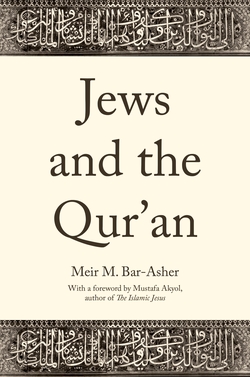 Bar-Asher, professor of Islamic Studies at the Hebrew University of Jerusalem, tackles one of the most delicate and subtle questions of religious history and current politics in this slender but packed book: what is the place of Jews in the Qur'an? (Before going further, note that he ignores the powerful body of revisionist history, limiting himself only to the increasingly discredited conventional history.)
Bar-Asher, professor of Islamic Studies at the Hebrew University of Jerusalem, tackles one of the most delicate and subtle questions of religious history and current politics in this slender but packed book: what is the place of Jews in the Qur'an? (Before going further, note that he ignores the powerful body of revisionist history, limiting himself only to the increasingly discredited conventional history.)
For starters, Bar-Asher sifts through Jewish life in Arabia before the Qur'an and concludes that, basically, no reliable information is available. When looking at the Islamic scripture, he finds "The image of Jews and Judaism that emerges from the Qur'an varies according to whether those meant are the biblical Hebrews or the contemporaries of Muhammad." To simplify, the former are praised and the latter are condemned. (In this, one sees an early version of the contemporary "people love dead Jews" phenomenon.)
Favorable Qur'anic verses portray Jews as the chosen people or as the Israelites who exited Egypt and arrived in the Promised Land or those who received the Torah. Unfavorable verses focus on idolatry, which Bar-Asher calls "tangible proof of the Hebrews' and then the Jews' rejection of monotheism"; on the weird Qur'anic assertion that Jews believe one Uzayr to be a prophet or even the son of God; or on the calumny that Jews murdered their own prophets.
In all, an "overarchingly negative vision of the Jews supplied a basis for de-legitimating and belittling them." Unsurprisingly, "The severe criticism leveled by the Qur'an against the Hebrews of the Bible, and then against the Jews of later generations, occupies a larger place than do its positive judgements."
Cognizant of their contemporary role, Bar-Asher comments that Qur'anic verses "can become 'explosive' when they are intentionally decontextualized so as to be brandished against the Jews and Christians of our day," and he provides a number of examples.
The author also takes up a range of other fascinating topics, such as the Qur'an's deeply ambivalent relationship to the Bible; the "transformed into apes and pigs" passage; the treatment of biblical accounts in the Qur'an; a comparison of laws in Judaism and in the Qur'an; and how Sunnis and Shi'ites historically have viewed Jews. Bar-Asher has written a small gem.
